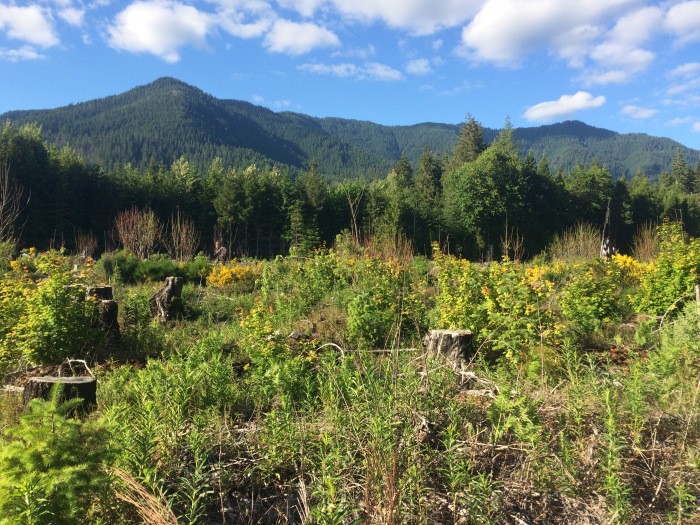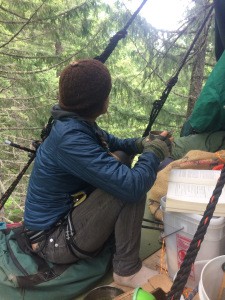From Its Going Down
McKENZIE BRIDGE, OR – Cascadia Forest Defenders (CFD) has initiated a tree sit on the Goose Timber Sale area surrounding McKenzie Bridge, Oregon to call attention to thousands of acres of public lands logging planned for the McKenzie River drainage and tens of thousands of acres of logging planned across the state. Over 18 million acres of Oregon’s forestlands is federally managed by the US. Forests Service and Bureau of Land Management (BLM).
The Goose Timber Sale Project is a 2,000 acre logging project that includes logging of nearly 1,000 acres inside an un-inventoried road-less area that adjoins the Andrews Experimental Forest to the north. CFD is embarking on this campaign to end the harvests of multiple Willamette National Forest and Eugene BLM timber sales in the McKenzie River watershed.
“It is long past due for state and federal agencies to declare a climate emergency and implement a moratorium of logging on all public lands across Oregon and the nation,” stated Shannon Wilson, a Cascadia Forest Defender since 1995.
In the report “The Great American Stand: U.S. Forests and the Climate Emergency”, released by the Dogwood Alliance in March 2017, it states the EPA estimates that “carbon emissions from logging from 2006 to 2010 was equal to 584 million metric tons of CO2, an amount greater than fossil fuel emissions from the residential and commercial sectors combined.”
“Protecting people’s drinking water and preserving public lands as carbon and biological reserves is about human survival and my community’s survival,” said Mathew Hawks, one of the activists in opposition to the Goose Timber Sale.
In 2012 CFD initiated a tree-sit that resulted in a lawsuit that temporarily stopped the sale until the Willamette National Forest completed an Environmental Impact Statement in 2016. However, the Forest Service increased the acres to be logged.
The McKenzie River is the sole drinking water source for the city of Eugene, Oregon according to the McKenzie Watershed Council. “We aim to draw attention to the sort of public lands logging that threatens endangered species with extinction, Eugene’s water supply, and the entire climate.” Stated native Oregonian Mary Grace Hickok.
 A view from Hwy 126 of the road-less area in the background.
A view from Hwy 126 of the road-less area in the background.
CFD says this tree sit is done as an act of solidarity with EO Wilson’s “Half-Earth” campaign to protect 50% of the Earth’s biosphere to preserve biodiversity. A Harvard professor for over 50 years, Pulitzer Prize winning author of 25 books, and the world’s most prominent biodiversity scientist, Wilson calls for “Half of the Earth” to be protected as wildlife reserves to save 90% of the remaining species on the planet.
“Protecting half of Oregon and all the nation’s public lands as carbon and biological reserves is the only viable avenue to address the climate emergency and extinction crisis,” stated Wilson. “We will continue to defend the forests until our society shifts their management of public resources to a more sustainable solution.”
If you want to be involved or be part of the tree sit please contact us.
To see the areas in Eugene’s watershed that could be impacted by logging, click on the link below:
McKenzie Map Project



From Its Going Down
McKENZIE BRIDGE, OR – Cascadia Forest Defenders (CFD) has initiated a tree sit on the Goose Timber Sale area surrounding McKenzie Bridge, Oregon to call attention to thousands of acres of public lands logging planned for the McKenzie River drainage and tens of thousands of acres of logging planned across the state. Over 18 million acres of Oregon’s forestlands is federally managed by the US. Forests Service and Bureau of Land Management (BLM).
The Goose Timber Sale Project is a 2,000 acre logging project that includes logging of nearly 1,000 acres inside an un-inventoried road-less area that adjoins the Andrews Experimental Forest to the north. CFD is embarking on this campaign to end the harvests of multiple Willamette National Forest and Eugene BLM timber sales in the McKenzie River watershed.
“It is long past due for state and federal agencies to declare a climate emergency and implement a moratorium of logging on all public lands across Oregon and the nation,” stated Shannon Wilson, a Cascadia Forest Defender since 1995.
In the report “The Great American Stand: U.S. Forests and the Climate Emergency”, released by the Dogwood Alliance in March 2017, it states the EPA estimates that “carbon emissions from logging from 2006 to 2010 was equal to 584 million metric tons of CO2, an amount greater than fossil fuel emissions from the residential and commercial sectors combined.”
“Protecting people’s drinking water and preserving public lands as carbon and biological reserves is about human survival and my community’s survival,” said Mathew Hawks, one of the activists in opposition to the Goose Timber Sale.
In 2012 CFD initiated a tree-sit that resulted in a lawsuit that temporarily stopped the sale until the Willamette National Forest completed an Environmental Impact Statement in 2016. However, the Forest Service increased the acres to be logged.
The McKenzie River is the sole drinking water source for the city of Eugene, Oregon according to the McKenzie Watershed Council. “We aim to draw attention to the sort of public lands logging that threatens endangered species with extinction, Eugene’s water supply, and the entire climate.” Stated native Oregonian Mary Grace Hickok.
CFD says this tree sit is done as an act of solidarity with EO Wilson’s “Half-Earth” campaign to protect 50% of the Earth’s biosphere to preserve biodiversity. A Harvard professor for over 50 years, Pulitzer Prize winning author of 25 books, and the world’s most prominent biodiversity scientist, Wilson calls for “Half of the Earth” to be protected as wildlife reserves to save 90% of the remaining species on the planet.
“Protecting half of Oregon and all the nation’s public lands as carbon and biological reserves is the only viable avenue to address the climate emergency and extinction crisis,” stated Wilson. “We will continue to defend the forests until our society shifts their management of public resources to a more sustainable solution.”
If you want to be involved or be part of the tree sit please contact us.
To see the areas in Eugene’s watershed that could be impacted by logging, click on the link below:
McKenzie Map Project